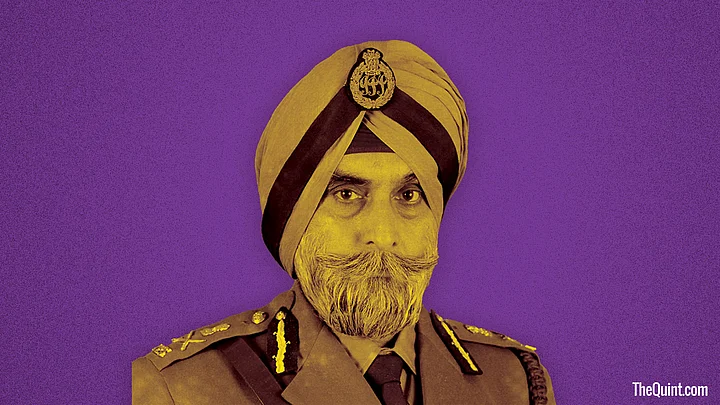KPS Gill, who could quote Byron with as much ease and fluency as he could recite Urdu sher, built his career in the Brahmaputra Valley of Assam. He spoke fluent Assamese, having spent over a quarter century in the state where he cut his teeth in his first posting. In Assam, he dealt with issues which were as distant from his native Punjab as possible – illegal immigration, communal rioting, ethnic conflicts, and agitations on issues of extraction of oil and its export to other states.
He courted controversy through his tenure, especially during the Assam agitation against illegal migration in the 1980s. His departure from Assam saw his steady ascendancy through a process that earned him the sobriquet of ‘supercop’ in Punjab.
‘Every Insurgency Leaves Behind Residual Criminality’
I never got to ask Gill what he thought of the 2007 Supreme Court Directives to all governments across the country on an appeal by Prakash Singh, former DGP Assam and Uttar Pradesh, to insulate police officers, especially the leadership, from political interference.
A man of few words, with a quiet voice that was gruff but occasionally raised in cheerful banter, Gill may have possibly brushed it aside. He may have looked down from his towering six foot plus frame, fixed me with his piercing eyes and probably said that he would have been quite capable of holding his own; to him, what you did, or achieved, depended on the individual, not the system.
I’m not going to write about the unquestionably brutal campaign that he ran in Punjab to crush militancy; there will be many who remember that process. He ran into opposition from his senior colleague, Chaman Lal – who did not believe in encounter killings – as well as the man he succeeded as Director General of Police, KS Dhillon. Dhillon was a professional, sensitive and erudite police official, who went about with a minimum number of guards to understand ground conditions and listen to people’s grievances on law and order.
But some of Gill’s words resonate: Every insurgency, he once said, leaves behind a “residual criminality”. That is visible in every state that has had the misfortune to go through armed uprisings, be in Nagaland or Manipur, Assam or Punjab, Chhattisgarh or Jammu and Kashmir or the anti-Maoist operations in Odisha, Andhra Pradesh and Maharashtra.
The residual criminality often seeps into the official system and infects the police as well.
Also Read: KPS Gill, Ex-Punjab DGP Who Countered Khalistani Terrorism, Dead
Beyond the Usual Tough Attitude
Gill was absolutely fearless. Once, during one of our many conversations over the years, he told me that he never carried a weapon in a public place. He would rarely carry the swagger stick that police officers are seen holding in one hand, while contemplatively tapping the other.
I recall a few incidents underlying his steeliness, but also his adaptability and readiness to listen to junior staff. In one of his earlier postings in Assam, Gill was getting frustrated by his seeming inability to curb a burst of crimes. One of the older constables went to the new sahib and said that if Gill gave the staff a mandate, they could get information. Within days, the police were getting good intelligence and nailing the culprits. That small story held him in good stead during the Punjab days when, after years of drying up, information started flowing in from villages to local police officers whom Gill backed to the hilt.
After the operation was over and the militants walked out, Gill stood, hands on hips, unarmed and without guards, watching and waiting as if for one particular person. When he spotted the man, Gill held him by the shoulder, towering over him, and spoke into his ear. The man went back into the temple complex. What was all that about? I asked later. Gill said he had sent instructions that anyone left behind would not be harmed if they surrendered.
Assam Was Close to His Heart
There was also the foreign correspondent who was summoned for a late breakfast. Gill wasn’t keen on the interview. The reporter’s colleague got a call after an hour or two saying that the drinks had started flowing.
A few hours later, the interview-seeking correspondent called again, sloshed and slurring, seeking to be taken to the hotel. Of course, there was no interview. And Gill, in his prime, could drink anyone under the table while retaining his own stoicism.
Assam, where I first met him, remained close to his heart. And in the First National Security Advisory Board, Gill, Prakash Singh and I produced the policy document on illegal migration and managing the migration not just through better border guarding but through a process of Multi-Tier Work Permits that would allow people to come legally for a limited time and then return.
First Meeting With Gill
The first meeting with Gill was unforgettable: I had just interviewed Prime Minister Indira Gandhi for the New York Times at Nellie – where over 1,700 Muslim peasants had been slaughtered by rioting mobs a few days earlier during the ill-fated election of February 1983.
She had been very defensive and I felt quite pleased with myself because all the other journalists were behind a security cordon which I had avoided.
As I turned about, I bumped into this turbaned giant of a man who was glowering at me. He gave me a shove. My first reaction beside righteous anger was of amazement, “What’s a Sikh in uniform doing in Nellie?”
Also Read: Goodbye KPS Gill, You Will Be Remembered
(The writer is is Director of the Commonwealth Human Rights Initiative (CHRI). This is an opinion piece and the views expressed above are the author’s own. The Quint neither endorses nor is responsible for the same. )
